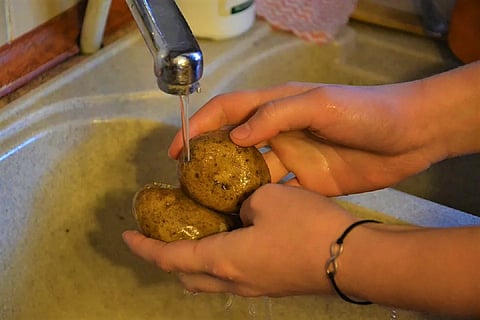

With COVID-19 here to stay, many steps are being taken to prevent the spread of the coronavirus – from guidelines issued to ensure physical distancing at all stores selling essentials, to reminders to frequently sanitise your hands. But the virus has also triggered off rumours and speculation on social media, which has led many to panic.
Across India, especially in the south, many people have been keeping everything they buy under the hot sun, or washing it in soap water, including vegetables, fruits and meat. Others have switched to only packaged items, and ensure that they douse the packets with sanitisers before opening it. A few have even stopped their newspaper subscriptions.
So does this really help? Or does it do more harm than good? Here's a guide on how to reduce the risk of coming in contact with the virus.
First off, DO NOT wash the vegetables in soap water.
"There are formaldehyde agents present in detergent, soap water and sanitisers. If consumed, they are harmful and can cause irritation in the bowels. While your intentions may be good, it is a bad idea," says Dr G Srinivas, President, Resident Doctors Association, Telangana.
"Just soak vegetables in hot tap water for 30 minutes to an hour and rinse it before you begin cooking," he recommends.
He also said that newspapers are scanned by ultra-violet rays while printing, so there is no need for further sanitisation as the risk of contracting the virus in this way is very less.
But for those who still wish to take precautions, experts first recommend using a washable cloth bag to buy essentials and drastically reducing the frequency of shopping. This by itself, is a big step towards keeping COVID-19 at bay.
Dr Shahid Jameel, a well-known virologist, and the Chief Executive Officer of the Wellcome Trust-DBT India Alliance, says that diluted fabric bleach, which has a small amount of sodium hypochlorite, can be used to prepare a cleaning solution.
The United States' Centre for Disease Control (CDC) suggests that a cleaning solution can be prepared by mixing five tablespoons of bleach with one gallon (3.8 litres) of room temperature water. This would be effective for 24 hours.
"Take out cans, tetra packs and bottles. Either soak a cloth in the solution and wipe them or spray the solution and wipe it down with a cloth. Discard cardboard boxes and other packaging material which can be done away with. If needed, transfer the contents into your own containers," Dr Shahid said.
The bleach must not be mixed with any chemicals other than water and it may also cause colour loss, if used on fabrics. It may also fade the print on surfaces, so it is not advisable to use the same for credit/debit cards.
For fruits and vegetables, Dr Shahid says that a cleaning solution can be made with one part of vinegar and three parts of water, which can be sprayed before they are rinsed with water.
Alternatively, one can also take two litres of water with two tablespoons of salt and half a cup of vinegar and soak the fruits and vegetables in the solution for five minutes, before rinsing them.
Eggs can be washed by hand, by just running tap water over it.
As far as the usage of cash or debit/credit card is concerned, experts suggest putting the card in a separate plastic bag after usage and later cleaning it using an alcohol swab. For cash, the currency notes can be laid down and spread out in between two sheets of white paper and a dry, hot iron can be gently run on it.
Besides this, the Food Safety and Standards Authority of India (FSSAI) has also issued its own recommendations on how to stay safe.
"Keep fruits and vegetables brought from vendors within the packet itself in an isolated place. Wash them thoroughly with lukewarm water or put a drop of 50 ppm chlorine in warm water and dip them in it. Clean the vegetables with potable drinking water. Do not use disinfectants, cleaning wipes or soap on fresh produce. Store fruits and vegetables which require to be refrigerated in the refrigerator. Keep the rest at room temperature in baskets or racks," the advisory states.
For those who wish to disinfect the screens of their digital devices like phones, laptops and tablets, the bleach solution is a strict no. Isopropyl alcohol needs to be used, which is found in all disinfecting wipes. The other option is to use ultra-violet rays, which may not be accessible.
The World Health Organisation (WHO) has recommended five things to ensure that the food that is being eaten is safe. They are – keep clean; separate raw and cooked; cook thoroughly; keep food at safe temperatures; and use safe water and raw materials.